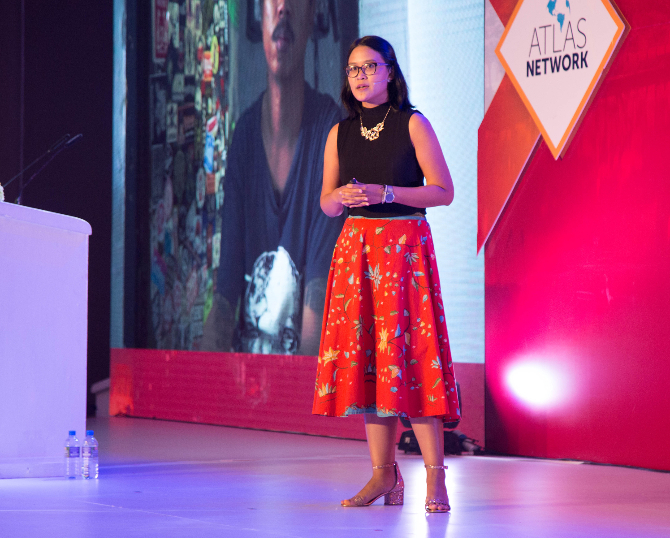
Atlas Network’s Asia Liberty Forum, co-hosted this year with Foundation for Economic Freedom, is quickly approaching at the end of September and will take place in Manila, Philippines. Among the range of speakers, panel discussions, and the Asia Liberty Awards Dinner, one of the highlights of the forum is the Think Tank Shark Tank competition, which gives three individuals from Atlas Network partners the opportunity to present a five-minute pitch to over 500 audience members and a panel of judges for the chance to receive US$10,000 in additional funding for their grant project.
This year at the Asia Liberty Forum, Anu Maria Francis (Centre for Public Policy Research, India), Ancella Christy (Center for Indonesian Policy Studies, Indonesia), and Ali Salman (Policy Research Institute of Market Economy, Pakistan) will participate in Think Tank Shark Tank 2022. Read on to learn more about the projects they will pitch.
Anu Maria Francis (Centre for Public Policy Research, India)
In India’s southern coastal state of Kerala, the tourism and hospitality sector contribute to 1.5 million employment opportunities within the state. Within tourism and hospitality, a major portion of Kerala’s revenue comes from the liquor industry. However, women are barred from equal employment opportunities due to legal restrictions that prevent women from working in any capacity involving serving liquor in licensed premises. Courts have more recently shown that they support a progressive approach to easing these restrictions through amendments to the law, which is also in line with India’s pledge to the U.N. Sustainable Development Goal of gender equality. Centre for Public Policy Research plans to strengthen the understanding of restrictions placed on women in the hospitality sector and to suggest amendments to the current legal framework, including provisions to the Kerala Abkari Act, Kerala Foreign Liquor Rules, and licensing conditions. Francis will advocate that this project will advance women’s access to employment opportunities in establishments with a bar license in Kerala, thereby ensuring greater economic and social freedom.
Ancella Christy (Center for Indonesian Policy Studies, Indonesia)
Within the first year of the COVID-19 pandemic, Indonesia gained 21 million new digital consumers, and in 2021 e-commerce transactions reached US$27 million. With these rapid increases in the digital economy comes government regulations. And while regulations may be necessary, they can also be heavy-handed and impede technological progress as they inevitably lag behind the rate of market developments. Center for Indonesian Policy Studies (CIPS) launched an approach of co-regulation which emphasizes responsibility-sharing between state and non-state actors and allows for the flexible adaptation of regulations and regulatory enforcement. The foundation to this approach is “DigiWeek,” an event that advocates for co-regulation by facilitating public-private dialogue, attracting the participation of top-level policymakers and private sector industry leaders alike. Christy will pitch an expansion to the scope of DigiWeek 2023, which will aim to engage university studies through greater participation of university lecturers by increasing the participation from just a few lecturers that joined in 2022, to organizing a full day workshop with at least 20 attending lecturers this coming year. Their goal for this network expansion is to further increase the opportunities for spreading policy ideas and messages of economic freedom throughout Indonesia.
Ali Salman (Policy Research Institute of Market Economy, Pakistan)
Sugarcane is an important cash crop in Pakistan, with over 100,000 people employed directly in the sugarcane industry, and millions of others in the rural population involved in its production. Each year, the sugarcane crushing season begins in November, while Pakistan sits on approximately 1.15 million tons of surplus sugar. This surplus is one of the outcomes of the excessive government footprint on the sugar market, which makes it more difficult for the industry to self-regulate in real time. The industry has been caught in an on-going cycle of inefficiency: not being able to export in times of surplus or import in times of shortage, mills not being able to export on time leading to a loss on their part and market prices declining, and declining prices signaling to farmers to grow less sugar the following season, setting in motion higher prices the next year. Policy Research Institute of Market Economy is engaging with stakeholders and working to complete a policy paper that analyzes the impact of government regulation on the sugar industry. Salman will make the case that this research project, and the promotion of its findings, will be a strong asset in promoting the use of open trade, both domestically and internationally, as a means of easing fluctuating prices, improving food security, and reducing burden on the government.
Stay tuned on our social media channels for updates to be among the first to learn which of these contestants will win the US$10,000 prize!